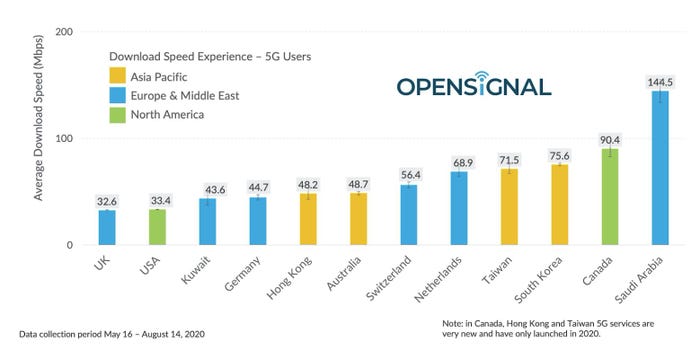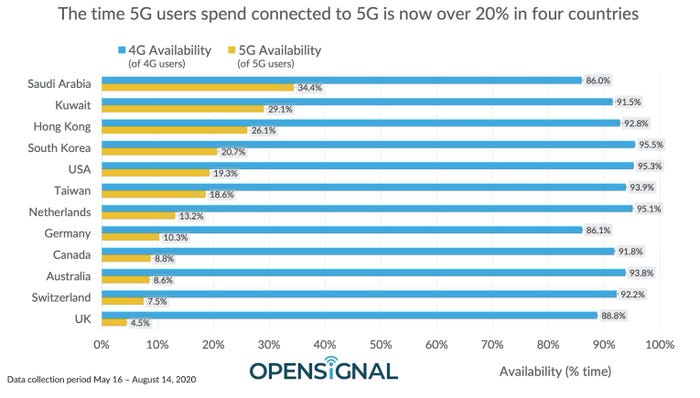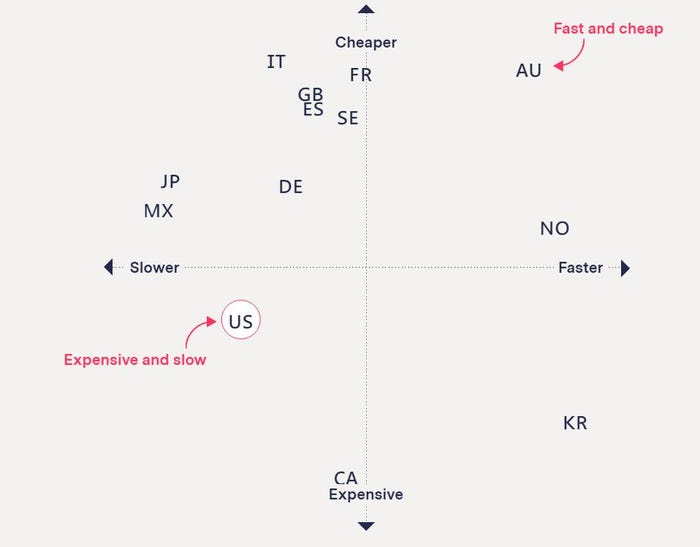Big Carriers Blasted for 5G Speeds: 'Compare Yourself to Other Countries'Big Carriers Blasted for 5G Speeds: 'Compare Yourself to Other Countries'
The U.S. is performing well in 5G availability, but average download speed is another story.

Average U.S. 5G network speeds lag behind that of other countries.
That’s according to Opensignal, which recently unveiled numbers around 5G network speed in 12 countries.
The data, collected between May and August, showed the U.S. lagging significantly behind its counterparts in 5G download speed. While the U.S. averaged 50.9 Mbps, Saudia Arabia averaged 414.2 Mbps.

Source: Opensignal

MSP Radio’s Dave Sobel
MSP Radio founder Dave Sobel said the three major wireless carriers need to consider how they’re performing globally, not just domestically.
“You compare yourselves against one another all the time. Why are you not comparing yourself to other countries? Verizon points at T-Mobile. T-Mobile points at AT&T. They all point fingers at one another. Saudi Arabia is 14 times faster than you guys, according to real world data. Compare yourself to them,” Sobel said.
The U.S. did perform better on 5G availability, slotting into fifth with an active 5G connection of 19.3%. T-Mobile and AT&T both use low-band spectrum, which lends itself more to availability than to speed. Saudi Arabia once again led the countries with a 34.4 5G network availability.

Source: Opensignal
And Then There’s Price
Nonprofit The Markup evaluated mobile plans costs and concluded that the U.S. prices rank third highest globally. That pairs poorly with the average download speeds.

Source: The Markup
Sobel called the state of U.S. 5G “incredibly market-limiting.”
“We as an industry are dependent on these companies,” Sobel told Channel Partners. “We’re dependent on the carriers, and unless they do their bit, the rest of us are all just behind.”
Sobel said carriers too quickly blame the size of the U.S. for the slower average speeds.
“I’d buy that argument if New York and D.C. and San Francisco were blazing fast and they were struggling with the rural places. I’d buy that argument, but that’s not what’s actually happening.”
Eugene Jeong of PhoneArena.com toured New York City this summer to test Verizon’s 5G speeds. He enjoyed download speeds surpassing 1 Gbps in some parts of the city. However, he called 5G reception “finicky.” Users often need to stand still to utilize the “blazing-fast speed.”
“It can take a bit of searching to find a spot with an ideal connection, and even then the speed isn’t perfectly consistent. But real-life download speeds showed significant improvements over normal LTE connections,” Jeong wrote.
Analyst Perspective
Peter Rysavy, president of Rysavy Research, urged readers to not jump to conclusions, given that 5G is in its early stages. He also pointed to population density.

Peter Rysavy
“The biggest determinants of performance are geography and spectrum. The United States has a lower average population density, so it takes longer to achieve the same coverage/performance as denser countries, such as in Asia,” he said.
Rysavy noted that the U.S. trails its peers in midband spectrum allocation.
“T-Mobile, with its 2.5 GHz spectrum, is achieving excellent midband performance. Verizon just acquired CBRS spectrum, which will bolster its midband performance,” he said. “But it will only be once C-band spectrum and 3.45-3.55 GHz can be deployed in the United States that the full potential of 5G will be realized here.”
T-Mobile’s Perspective
T-Mobile announced on Monday that it has added 121 cities and towns to its network. The company told Channel Partners that it offers …
… the largest nationwide 5G network in the U.S. Moreover, the company said increased midband spectrum rollouts are improving speeds.
“Testing has shown download speeds of up to 1 Gbps and average speeds of around 300 Mbps on T-Mobile’s midband 5G. That’s 7.5 times faster than today’s average LTE speeds. With more low and midband spectrum than anyone else in the U.S. and dedicated spectrum for 5G, T-Mobile is the only one delivering 5G with both coverage and speed. T-Mobile 5G is running circles around the competition and meanwhile, Verizon’s 5G is only available less than 1% of the time in parts of a few dozen cities,” T-Mobile said.
Verizon and AT&T did not immediately respond to a request for comment.
Sobel said partners – MSPs in particular – function as integrators and combiners rather than as builders; thus, they rely on manufacturers to make their jobs possible. He pointed to IoT and smart cities as markets that the technology channel can open up once the proper infrastructure falls into place.
“You’re waiting on the upstream pieces to do their jobs, to go unlock this possibility. I don’t think anyone denies there are all these possibilities. We have all this great potential here. We’ve all identified it. We’ve been talking about it for years now,” he said.
Read more about:
AgentsAbout the Author
You May Also Like


